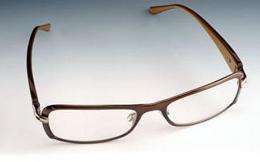June 23, 2010 report
Electronic spectacles coming to market soon

(PhysOrg.com) -- US company PixelOptics has invented electronic spectacles that can automatically change focus as you lower your head to read a book, and could spell the end of the bifocal.
The product, called emPower!™, has been under development for 10 years and looks like an ordinary pair of spectacles. It will be available in a wide range of frames and colors. The only visible difference is a small button on the side, which is used to select one of three operating modes.
According to PixelOptics the patented electronic lenses provide dynamic and intelligent optics by using a combination of “chemistry, electricity, and other components” to correct for visual problems such as presbyopia, or loss of near focus common in people over 40. The lens has a section with an electro-active liquid crystal layer within it, and the index of refraction of this layer can be changed by a small electrical current passing through it, with the focal length varying with the current applied. Motion detection of the glasses is achieved by motion sensors similar to those used in the iPhone.
In automatic mode the electro-active layer is turned on and the focus changes automatically and almost instantly as the wearer tilts his or her head (to read a book or newspaper for example) and looks through the transparent electronic layer. In manual on mode the lenses behave like normal progressive lenses with the electronic layer frozen in the on position for close distances with the eyes looking down, but objects straight ahead in the distance can still be seen clearly. In manual off mode there is no current in the electronic layer, and so the lenses act like a low power progressive lens, which has little distortion and is good for everyday activities such as playing sports, walking, and so on.
Bifocals are thought to have been invented by Benjamin Franklin in the 1780s, and incorporate two lenses of different strengths. Until now have commonly been used by wearers who want to be able to focus on close objects and in at greater distance without changing glasses. Some wearers find them uncomfortable because of the small field of view, which means they must move their heads while reading. Some wearers also complain of dizziness or headaches. Other options are multi-focal lenses or progressive lenses.
The electronic glasses give a wider field of view with much less distortion than traditional bifocal lenses or progressive addition lenses. They also give optimal vision for far and near distances, and in between.
Commercialization of the electronic spectacles is being achieved by PixelOptics in partnership with manufacturers of frames and lenses and with electronic development and component companies.
The rechargeable battery is recharged over two to three hours in a charging cradle. PixelOptics will be recommending the glasses be recharged every night, but they will hold their charge for three to five days.
CEO of PixelOptics, Ronald Blum said the emPower! will be market tested in the last quarter of this year in Washington DC, Virginia and North Carolina and will be released for general sale in the US later in 2010. It will be reach European markets early in 2011.
More information: www.pixeloptics.com/pages/electronic_eyewear.html
© 2010 PhysOrg.com
















